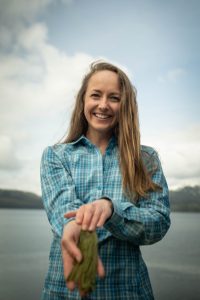
Member, Oil Spill Prevention and Response Committee
Volunteer Spotlight: Skye Steritz
Skye Steritz’ passion for a clean environment started at an early age, during a childhood spent outdoors in Texas.
“I was raised with environmentalist values and became an advocate, especially for water, as I got older.”
You can hear the smile in her voice when she’s asked why she first moved to Alaska.
“My love of water,” she replies. “It’s critical to thriving of life on earth.”
Growing respect for diverse opinions
Her father was a geophysicist for Exxon for 30 years; conversations with him gave her a well-rounded perspective and a deep respect for oil workers.
“He recognizes the threats of transporting oil, from drilling to pipelines to tankers,” she explains. “My conversations with him prepped me to be able to communicate with people from all backgrounds.”
She pursued these ideas after high school, racking up three Masters degrees: water resources policy and management; water management and governance; and water cooperation and diplomacy. Her studies took her to Ghana, the Netherlands, Costa Rica, California, and Oregon.
“I was in water management classes with students from all over the world,” Steritz mentions. “In the Netherlands, I was one of two from the U.S. out of about 200 students.”
Her studies included collaborative projects, working with people from different cultures with different communication styles.
“We were learning to listen deeply and understand where people are coming from,” Steritz continues. “We integrated ideas together, rather than assuming any one person had all the answers.”
Steritz believes that’s an integral part of living in small-town Alaska. “You’re going to have neighbors that have different opinions than you and that’s okay. We all still need to work together.”
Steritz landed in Soldotna at first, working for the Kenai Watershed Forum. She now lives in Cordova, where she works as a kelp farmer and a special education aide at Mt. Eccles Elementary School.
She recalls her first glimpse of Alaska during her plane trip to Soldotna in 2015. “I was having a dream about a community caring for each other in a really cold, harsh subarctic environment, helping each other through a tough winter,” she recounts, “then I woke up, and the first part of Alaska that I ever saw was Prince William Sound.”
“I just remember being filled with awe,” she shares. “It feels full circle that I live here now and work on the Sound.”
Cultivating the environment by growing healthy food

Steritz’ latest adventure puts her values to work. In 2019, she and her partner Sean Den Adel started Noble Ocean Farms, a new kelp farm in Simpson Bay, near Cordova.
“It increases food security and nutrition security for rural communities like ours and provides habitat for fish species like salmon and herring.”
They are currently growing ribbon and sugar kelp. After spores are collected in nearby waters, they are then grown in seawater aquariums at the Alutiiq Pride Marine Institute and Native Conservancy. Once they are big enough to survive on their own, the still-tiny kelp get shipped back to Steritz and Den Adel, who “plant” them along ropes attached to a structure below the water surface. The kelp is harvested in April and May. They plan to sell fresh kelp at the docks in Cordova and potentially Whittier and Valdez.
Volunteering for the Council
When Steritz first moved to Cordova, she participated in Alyeska’s Ship Escort/Response Vessel System’s fishing vessel training program to clean up oil spills.
“It became very clear how hard it would be in reality to clean up an oil spill,” she says. “It seems like an astronomical challenge, so our only true hope is prevention.”
In 2020, Steritz joined the Council’s Oil Spill Prevention and Response, or OSPR, Committee.
She is interested in spill planning for the Copper River Delta area, in particular a project OSPR developed to capture the history of the Copper River Delta and Flats’ oil spill protection strategies.
In the 90s, a group of Cordovans pushed to get geographic response strategies developed specifically for the region. The area is home to important marine species and cultural sites, and it would be particularly challenging to clean up a spill in the area. The results were adopted into government plans in the late 90s. The committee is working with researchers to document that history, including why this work was later dropped from the government plans, and how to support planning for the area in future.
“People in our community are concerned that there is not a plan for the Flats in place currently,” Steritz notes.